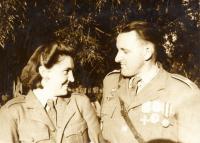I hate to remember all the things we were through, but despite this our life was beautiful.

Download image
Marie Lomská, née Findejsová, was born on March 16, 1920, in a family of Volhynian Czechs in what was at the time Poland. Her parents owned a butchery. She attended a Czech school and was a member of the Sokol. In 1939 the Polish part of Volhynia became part of the Soviet Union and in 1941 followed the occupation by German forces. The fear of attack by Ukrainian nationalists’ gangs on the Czech and Polish villages became everyday reality during the war. Marie Findejsová was arrested by the Germans and served as a cook in a German camp nearby Rovno. She was rescued from captivity by an employee of the post office, Mr. Novotný. During the liberation of Volhynia by the Red army she was sexually harassed by a Soviet officer. In April 1944 Marie Findejsová joined the Czechoslovak army and was assigned to the General Staff. In August 1944, she married Captain Bohumír Lomský in Lviv. She witnessed fighting in Krosno. She stayed with the Czechoslovak army until its glorious return to Prague. She, however, missed the parade. After the war, she managed to get her mother from Volhynia to Czechoslovakia. This was possible because of the post-war repatriation schemes. She raised two daughters and one son. Her husband held the position of the Minister of National Defense in the period 1956 - 1968.
